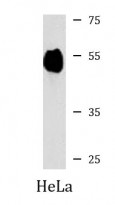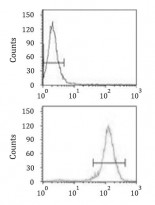ARG56228
anti-RBBP7 / RbAp46 antibody
anti-RBBP7 / RbAp46 antibody for Flow cytometry,Western blot and Human
Overview
| Product Description | Rabbit Polyclonal antibody recognizes RBBP7 / RbAp46 |
|---|---|
| Tested Reactivity | Hu |
| Predict Reactivity | Ms, Rat, Bov, Mk, Xenopus |
| Tested Application | FACS, WB |
| Host | Rabbit |
| Clonality | Polyclonal |
| Isotype | IgG |
| Target Name | RBBP7 / RbAp46 |
| Antigen Species | Human |
| Immunogen | KLH-conjugated synthetic peptide corresponding to aa. 1-30 (N-terminus) of Human RBBP7 / RbAp46. |
| Conjugation | Un-conjugated |
| Alternate Names | Retinoblastoma-binding protein 7; Nucleosome-remodeling factor subunit RBAP46; Retinoblastoma-binding protein p46; RBBP-7; RbAp46; Histone acetyltransferase type B subunit 2; Histone-binding protein RBBP7 |
Application Instructions
| Application Suggestion |
|
||||||
|---|---|---|---|---|---|---|---|
| Application Note | * The dilutions indicate recommended starting dilutions and the optimal dilutions or concentrations should be determined by the scientist. | ||||||
| Positive Control | HeLa |
Properties
| Form | Liquid |
|---|---|
| Purification | Purification with Protein A and immunogen peptide. |
| Buffer | PBS and 0.09% (W/V) Sodium azide. |
| Preservative | 0.09% (W/V) Sodium azide. |
| Storage Instruction | For continuous use, store undiluted antibody at 2-8°C for up to a week. For long-term storage, aliquot and store at -20°C. Storage in frost free freezers is not recommended. Avoid repeated freeze/thaw cycles. Suggest spin the vial prior to opening. The antibody solution should be gently mixed before use. |
| Note | For laboratory research only, not for drug, diagnostic or other use. |
Bioinformation
| Database Links | |
|---|---|
| Gene Symbol | RBBP7 |
| Gene Full Name | retinoblastoma binding protein 7 |
| Background | This protein is a ubiquitously expressed nuclear protein and belongs to a highly conserved subfamily of WD-repeat proteins. It is found among several proteins that binds directly to retinoblastoma protein, which regulates cell proliferation. The encoded protein is found in many histone deacetylase complexes, including mSin3 co-repressor complex. It is also present in protein complexes involved in chromatin assembly. This protein can interact with BRCA1 tumor-suppressor gene and may have a role in the regulation of cell proliferation and differentiation. Two transcript variants encoding different isoforms have been found for this gene. [provided by RefSeq, Nov 2010] |
| Function | Core histone-binding subunit that may target chromatin remodeling factors, histone acetyltransferases and histone deacetylases to their histone substrates in a manner that is regulated by nucleosomal DNA. Component of several complexes which regulate chromatin metabolism. These include the type B histone acetyltransferase (HAT) complex, which is required for chromatin assembly following DNA replication; the core histone deacetylase (HDAC) complex, which promotes histone deacetylation and consequent transcriptional repression; the nucleosome remodeling and histone deacetylase complex (the NuRD complex), which promotes transcriptional repression by histone deacetylation and nucleosome remodeling; and the PRC2/EED-EZH2 complex, which promotes repression of homeotic genes during development; and the NURF (nucleosome remodeling factor) complex. [UniProt] |
| Cellular Localization | Nucleus. |
| Calculated MW | 48 kDa |
Images (2) Click the Picture to Zoom In
-
ARG56228 anti-RBBP7 / RbAp46 antibody WB image
Western blot: 35 µg of HeLa cell lysate stained with ARG56228 anti-RBBP7 / RbAp46 antibody.
-
ARG56228 anti-RBBP7 / RbAp46 antibody FACS image
Flow Cytometry: MDA-MB-231 cells stained with ARG56228 anti-RBBP7 / RbAp46 antibody (bottom histogram) or without primary antibody control (top histogram), followed by incubation with FITC labelled secondary antibody.







